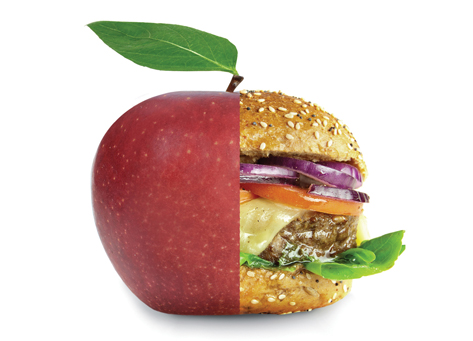Nutrition: Going against the grain
In Clinical
Follow this topic
Bookmark
Record learning outcomes
A report published last summer reignited the debate regarding which diet is best for health and weight loss €“ so what is the current thinking? And is there any science behind the latest 'fad' diets?

Key facts
-
Several competing theories exist as to the type of diet to follow in order to lead a healthy life and avoid being overweight
-
Last year, a report that called into question core aspects of received nutritional wisdom was met with a barrage of criticism
-
It is important pharmacy teams understand that, despite the publication of the report, the basic recommendations on weight loss have not changed
The UK's obesity crisis is rarely out of the headlines, with new reports emerging on a regular basis that detail the impact it is having on health, including soaring rates of type 2 diabetes and increased risk of heart disease. With over 60 per cent of UK adults overweight or obese, pharmacists and other health professionals are all too aware of the harm poor nutrition can cause and of the need for effective weight loss interventions.
The risks are stark. According to Public Health England, an obese man is five times more likely to develop type 2 diabetes, and more than two-and-a-half times more likely to develop high blood pressure, while obese women are thirteen times more likely to develop type 2 diabetes and more than three times more likely to have a heart attack. Other health risks include angina, liver disease, osteoarthritis and stroke.
As a sector, community pharmacy needs to be creative and proactive on a range of issues if it is to prove its worth to the community €“ and dietary advice is no exception. The growth in lifestyle-related illness in recent years inspired the creation of healthy living pharmacies, with teams trained to support behaviour change and improve health and wellbeing, and a designated health champion in place to lead on issues such as diet and exercise. But how are pharmacy teams to know whether they are providing the correct advice?
While many of us feel we have a firm grasp of the key recommendations €“ limit calories, exercise more and avoid high amounts of fat, sugar and salt €“ this area is no stranger to controversy. Several competing theories exist as to the type of diet to follow to lead a healthy life and avoid being overweight, although it is important to note that some recommendations have more scientific backing than others.

Called into question...
In May 2016, a report called into question core aspects of received nutritional wisdom. The National Obesity Forum, which frequently comments on weight-related health issues, came together with the newly-formed Public Health Collaboration to publish 'Eat fat, cut the carbs and avoid snacking to reverse obesity and type 2 diabetes' €“ a report that swiftly prompted media controversy and a backlash from leading health bodies and academics.
In its introduction, the report argued that over the past 50 years the vast majority of the increase in calorie intake in the US had been in the form of carbohydrates and polyunsaturated vegetable oils, and that the €conspicuous rise in obesity immediately following their introduction suggests that they are a root cause
of the problem€.
The authors also claimed that public bodies that ought to be protecting our health have sometimes allowed their objectivity to be clouded by manufacturers' prerogatives. They speak of a €scandal€ whereby €academics, institutions and journals whose primary responsibility is to patients and scientific integrity have at times colluded with industry for financial gain€.
Overturned
Over the course of ten central arguments €“ which include eating fat does not make you fat; limit starchy and refined carbohydrates to prevent and reverse type 2 diabetes; stop counting calories €“ the authors attempt to overturn existing nutritional guidelines.
The report claims that saturated fat has been unfairly demonised by government health departments since the late 1970s, pointing out that, €the most natural and nutritious foods available €“ meat, fish, eggs, nuts, seeds, olive, avocados €“ all contain saturated fat€¦ [and] have been eaten ad libitum without adverse health consequences for millennia€.
The authors refer to an analysis of 53 randomised trials, which concluded that €higher fat weight loss interventions led to significantly greater weight loss than low-fat interventions€.
On the other hand, they say, processed foods labelled 'low fat', 'lite' and 'low cholesterol', which Public Health England (PHE) recommends as safer alternatives to saturated fats, should be avoided. One study the report cites found that €high intake of omega-6 oils (from vegetable oils/margarines) increases the risk of death and heart disease compared to saturated fat plus trans-fat€.
Also to be avoided, the report says, or at least limited, are starchy carbohydrates €“ contradicting decades of recommendations that this food group be represented at every main meal. The authors claim that type 2 diabetes patients €demonstrate profound carbohydrate intolerance€ and that dietary carbohydrate restriction €should be the first approach in diabetes management€.
They point to the work of diabetes expert Dr David Unwin, who achieved significant results from recommending a low carb, high fat diet to patients, and say that €if we were able to replicate these results in the 9,400 surgeries across the UK, we could potentially save £423 million a year on drugs for diabetes alone.€

Counting calories
For people who are well versed in traditional slimming recommendations, perhaps the most radical ideas in the report are the attacks on the beliefs that €a calorie is a calorie€ and that exercise should be a key component of any weight loss regimen.
The report goes so far as to say that €calorie focused thinking has damaged public health€. It argues that while €it is often assumed that excessive caloric intake is the root cause of obesity€¦ a calorie of food energy can have different metabolic fates depending upon the hormonal stimulation.
€Shifting focus away from calories and emphasising a dietary pattern that focuses on food quality rather than quantity will help to rapidly reduce obesity, related disease and cardiovascular risk.€
If excess calorie intake is not the cause of obesity, the report claims, then it follows that it is not possible to €outrun a bad diet€. The authors say that while exercise has many proven health benefits, it has little effect on waistlines. This is because obesity is a €hormonal disorder leading to abnormal energy partitioning, which cannot be solely fixed by increasing exercise€.
Damning response
Response to the report from mainstream health experts was damning, with Public Health England attacking the report as €irresponsible€. PHE chief knowledge officer Professor John Newton contrasted the allegedly €cherry picked€ science highlighted in the report with the roughly 600 peer-reviewed scientific reports on carbohydrates alone that the Scientific Advisory Committee on Nutrition used.
€Our priority is to advise the public, clearly and consistently, basing the advice on broad, robust and objective evidence,€ he says. €To improve diet, reduce obesity levels and the risk of serious illnesses such as heart disease, type 2 diabetes and some cancers, our advice remains that people should base meals on starchy carbohydrates, especially wholegrain; eat at least five portions of a variety of fruit and vegetables each day; and cut back on food and drink high in saturated fat, salt, sugar and calories.€
Responding to allegations of collusion with food companies, PHE points out that it engages with a broad range of stakeholders when it makes changes to advice, and this includes representatives of the food and drink industry. €As the organisation that advises the Government on dietary guidelines, it would be irresponsible for us not to engage with those who produce and market the food we all eat.€
This report is not based on a rigorous and systematic review of the scientific evidence
Unsystematic
The Centre for Evidence-Based Medicine (CEBM) was equally critical, saying that while it welcomed efforts to inform patients and clinicians on evidence-based dietary information, the NOF/PHC publication €appears to be highly unsystematic in its approach to the recommendations it makes and will likely add to the confusion and misinformation provided to practitioners€.
CEBM highlighted discrepancies between the recommendations in 'Eat fat, cut the carbs€¦' and other materials the NOF has published, suggesting that this may undermine the report's credibility. For example, the Obesity Care Pathway Toolkit on the NOF website includes statements such as: €Physical activity plays an important part in the prevention and management of obesity, but only if it is sustainable€.
The same document contains different recommendations around dietary fat from the report, advising that people €choose foods that have no more than three to five grams of fat per 100 grams of product€. The NOF has since appeared to distance itself from the report, saying its board €were not given the opportunity to see the document or give any input€.
CEBM welcomed as €laudable€ NOF/PHC's statement that €evidence-based nutrition should be incorporated into education curricula for all healthcare professionals€, but points out that to make proper use of the best available data, systematic reviews are invaluable. Instead, CEBM said, 'Eat fat, cut the carbs€¦ draws mostly on editorials, non-systematic narrative reviews and single studies. €Only five of the 43 references cited in the report are in the form of a systematic review,€ it says.
A systematic review and meta-analysis comparing low fat diets to low carbohydrate ones is €referred to but not cited€, while the report found only small differences in weight loss that
€do not seem to justify some of the overarching statements made in this report€.
€Furthermore, there is no mention of whether any of the included references were found using a systematic search€, making it more likely that citations are €cherry picked€ and used to support a biased perspective.
Other responses
A host of other voices, including many scientists and academics, came out against the report, criticising its methodology and conclusions. €The messages in the report conflict fundamentally with current dietary advice on healthy eating and it has a number of flaws,€ says UK Health Forum director of global health, Modi Mwatsama.
€First, unlike Public Health England's Eatwell Guide, this report is not based on a rigorous, systematic and comprehensive review of the scientific evidence.€
Dr Gunter Kuhnle, a nutritional scientist at the University of Reading, warned that the risks of radically overhauling health recommendations exceed any perceivable benefits. €There is only very limited evidence on the long-term impact of using dietary fat as the main source of calories.
€There are only a very few long-term studies and they do not suggest that cutting back on carbohydrate is as beneficial to health as it is claimed. €Virtually no research has been carried out to show the impact of recommending a very low carbohydrate diet to the general public.€
Others noted that while low carbohydrate diets can be beneficial for dieters and people with type 2 diabetes, this is due to reduced calorie intake €“ and not a reason to increase saturated fat intake drastically.
€Low carbohydrate diets can be an effective way to lose weight because they help cut calories,€ says Susan Jebb, professor of diet and population health at the University of Oxford.
€But while they are labelled as 'low carb', cutting carbs generally cuts fats too, because there is no butter on bread, or oil on pasta, for instance. It is misleading to suggest that a low carb diet is a licence to consume fat in abundance.€
What to conclude?
It is important pharmacy teams understand that the basic recommendations on weight loss have not changed. NHS healthy eating guidelines still advocate that meals should be based on starchy carbohydrates, that reduced dairy fat and unsaturated oils are healthy options, and that exercise plays a crucial role in weight management.
This is not to say that the guidelines are not subject to review, or that the NOF/PHC report is entirely without merit. As Professor Naveed Sattar of the University of Glasgow says, €it has good, bad and ugly elements in it€, and debate is a healthy thing in any scientific field.
What the response to the report does indicate is that current guidelines are based on the most comprehensive analysis of available data, and that the best thing pharmacy can do is communicate this advice clearly at every opportunity.
There has been no shortage of fad diets but, rather than being swayed by dieting trends, expert opinion seems to be that healthcare professionals should stick to tried-and-tested science.
